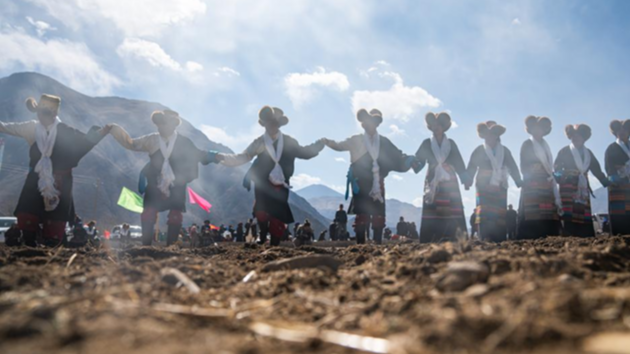
Farmers sing during a ceremony marking the start of spring farming in Doilungdeqen district in Lhasa, southwest China's Xizang Autonomous Region, March 16, 2024. [Photo/Xinhua]
By Liang Junyan
On July 12, U.S. President Joe Biden formally signed into law the Promoting a Resolution to the Tibet-China Dispute Act, which states that the U.S. government has never taken the position that Xizang has been a part of China since ancient times, and that disputes between Xizang and China must be resolved by peaceful means in accordance with international law through dialogue without preconditions.
This is an attempt to play the Xizang card and interfere in China's internal affairs once again. Xizang has been part of China since ancient times, and Xizang affairs are an internal affair of China that brook no interference from any outside force. Archaeological discoveries in this southwestern region of China reveal a long and close connection between it and the rest of the Chinese mainland, confirming the unity of the Chinese nation in its diversity.
For example, among the artifacts found in the tomb of Guru Jiamu in Ali, the Xizang Autonomous Region, dating from the Eastern Han Dynasty around 2,000 years ago, was a brocade item more than 1,800 years old. Patterned with birds and beasts, it bore the Chinese character "wanghou," meaning nobility, and was the first silk relic found on the Qinghai-Xizang Plateau, proving the long history of interactions and exchanges between the region and the mainland and among the different ethnic groups.
The so-called question of Xizang's status is due to the imperialist invasion of China. However, in modern times, even during the period of the Republic of China (1912-1949), the central government exercised sovereignty over Xizang, and no country openly recognized an independent Xizang.
In the United States, for example, as early as 1890, American diplomat William W. Rockhill put forward the view that "Tibet is an integral part of China." It had a significant impact on the American government's policy towards Xizang at the time, an impact that lasted until the 1940s.
It was only on the eve of the founding of the People's Republic of China in 1949 that the U.S. government's policy and position on Xizang gradually changed. Now, the U.S., in defiance of historical facts, has gone so far as to claim that it "has never taken the position that Xizang has been a part of China since ancient times." I wonder how the older generation of U.S. diplomats, such as Rockhill, would feel were they still alive. What do American politicians hope to gain by distorting the facts?

A huge thangka painting is unrolled during the "sunning of the Buddha" ceremony at the Drepung Monastery in Lhasa, Xizang, Aug. 16, 2023. [Photo/Xinhua]
Since Xizang's peaceful liberation in 1951, which drove imperialist forces out and brought historic progress, and since the democratic reforms in 1959, the region has been enjoying social peace and harmony with high-quality development. It has sustained a good economic performance and people's livelihood and well-being have improved significantly.
However, there are always some countries that are not used to Xizang enjoying a good life and they try to do everything possible to block China's development. The U.S., with its hegemonic ideology, calls itself the "defender of human rights" and acts as the "world's policeman," always pointing a finger at the state of human rights in other countries, while its own human rights situation is mired in racial discrimination, gun violence, disparity between the rich and the poor, abuse of immigrants and child labor. The United States should first look into its own human rights issues before making accusations against other countries.
Trying to distort the facts through domestic legislation and denying the history that Xizang has been part of China since ancient times is just another clumsy maneuver to smear China. The United States needs to abide by the one-China principle it agreed to, desist from supporting any form of "Xizang independence," and withdraw the new legislation meddling in China's internal affairs. The attempt to distort the facts is bound to end in failure, opposed not only by China but also by all other right-minded nations.
Liang Junyan, a special commentator on current affairs for CGTN, is a researcher at the Institute of History Studies of China Tibetology Research Center.

 中文
中文



